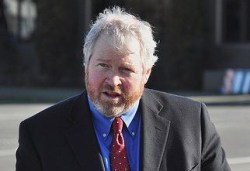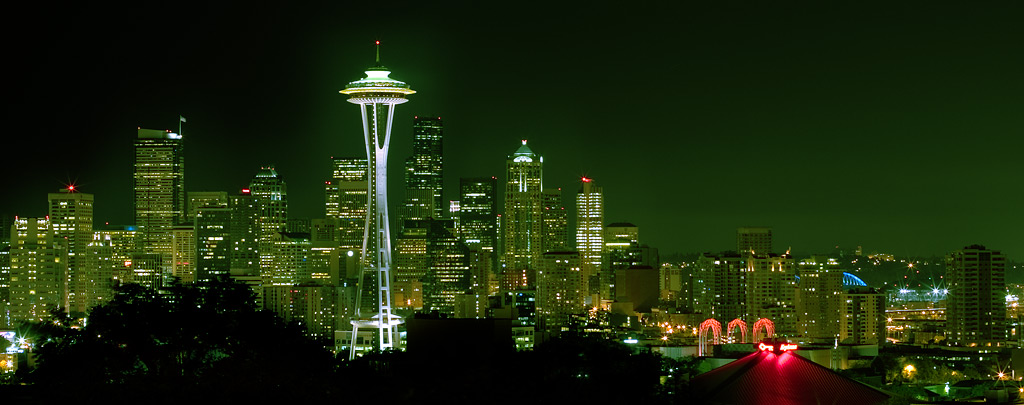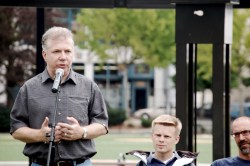Seattle is already known as one of the nation’s greenest cities (in more ways than one). Local political controversies brew left of center, and environmental inclinations are practically a prerequisite for running for office. If no candidate poses a fundamental threat to the city’s signature sustainability, how much is really at stake in today’s mayoral race?
Incumbent Mayor Mike McGinn was a relative unknown when he ran four years ago — the lawyer, Sierra Club leader, and avid bike commuter had never held political office, but he pushed a pro-transit, grassroots agenda to defeat then-incumbent Greg Nickels, who had an impressive enviro record of his own. Nickels was notorious for being difficult to work with, and McGinn’s reputation has followed the same course — his thorny leadership style has become his most well-known weakness.

Seattle Mayor Mike McGinn.
But McGinn didn’t disappoint when it came to upholding Seattle’s reputation as an international leader on urban climate and sustainability issues. He’s made his opposition to coal-export terminals loud and clear and brought together a coalition — the Leadership Alliance Against Coal — of other regional business and political leaders who feel the same way. He called for the city to divest its pension funds from fossil fuels. And, true to his original bike-boosting image, McGinn has continued to expand Seattle’s cycle infrastructure. The mayor committed funds to the city’s bike master plan and has overseen the installation of protected bike lanes on major routes. He also called for a Seattle-only ballot measure to raise funds for the expansion of light rail to keep transit dollars from getting held up at the county and state level by suburban politicians reluctant to fund anything that might benefit Seattle’s unwashed carless masses.
What will happen to McGinn’s impressive green agenda if his challenger, State Sen. Ed Murray, triumphs, as the polls suggest is likely?
Murray, an 18-year veteran of the Washington state legislature, has the advantage of widespread positive name recognition thanks to his sponsorship of the state’s marriage-equality law, which voters upheld last fall in a narrow and emotional victory. But Murray’s civil-rights leadership doesn’t mean he’s progressive on all issues, cautions The Stranger:
We’re also concerned that Murray is positioning himself as an anti-bicycle-lane candidate. The driving force of a fundraiser this month “Paid for by Ed Murray for Mayor” were people who sought to “oppose Mayor McGinn’s cycle track” on Westlake Avenue. “This is a narrowly focused event,” said an invitation to Murray supporters by Peter Schrappen of the Northwest Marine Trade Association. “The sole focus should be around articulating the Westlake interests.”
In general, Murray supports most of the same good things McGinn does — blocking coal trains (even if he hasn’t been as outspoken as the mayor about his opposition), expanding transit, building density (including microhousing). But while Murray scored an endorsement from the Washington Conservation Voters, much of his support comes from Seattle’s downtown pro-business faction, the closest thing Seattle has to a conservative force. Murray racked up endorsements from influential local leaders like former King County Executive Ron Sims, former Washington Gov. Chris Gregoire, five of nine city council members, the city attorney, and the county sheriff.
McGinn, on the other hand, still rocks the grassroots ground game, and apparently hasn’t lost the backing of the progressive groups that helped get him elected in the first place. He boasts endorsements from 350.org’s Washington chapter, the Sierra Club, the Transit Riders Union, the Northwest Energy Efficiency Council, the widely read Seattle Bike Blog and Seattle Transit Blog, and the Cascade Bicycle Club, not to mention NARAL Pro-Choice Washington, the African American Political Action Committee, Asian Pacific Islanders for Civic Engagement, American Muslims of Puget Sound, and the Union of Eritrean Women.
If you look just at each candidate’s sources of support, McGinn, despite being an incumbent trailing in the polls, still comes across as the scrappy people’s candidate. In the primary, Murray carried some of Seattle’s wealthiest neighborhoods (Laurelhurst, Queen Anne), while McGinn did better in younger, denser, more diverse parts of the city (Fremont, the Central District, South Seattle). He has the support of homeless and refugee groups and, thanks to his efforts to bring an NBA team back to Seattle, is the favored candidate of diehard Sonics fans.
Whatever happens today could hinge on how many Seattleites bother to cast ballots at all in this election, which has a distinct day-after-Christmas air of letdown after last year’s bonanza of history-making political victories. But for Seattleites bored to tears of choosing yet again, between two white guys who basically agree on all major issues, there’s other stuff on our ballot, too. There’s a genuine socialist, an actual outsider, holding her own against a city-council incumbent. There’s a proposition to create a public campaign-financing system, to give people other than boring white guys a better shot at running for mayor in the future. Oh, and a little item concerning GMO labeling. Stay tuned …




